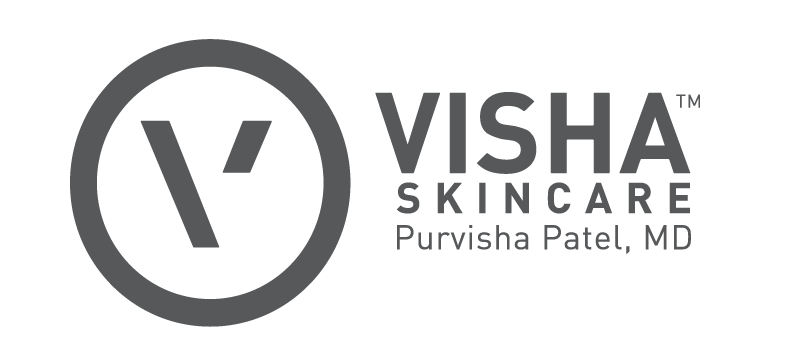
Healthline posted "What Role Does Propylene Glycol Have in Skin Care and Beauty Products?" In this article, Visha Skincare founder, Dr. Purvisha Patel's expertcommentary on Propylene Glycol in skin care, and features Visha Skincare's Advanced Correcting Serum.
If you’ve ever scanned the ingredient label on your bottle of lotion, shampoo, or even serum, you may have noticed the ingredient propylene glycol. This colorless, odorless, syrupy liquid is water soluble with hydrating properties, so it’s a common additive in a wide range of skin care products. But there’s some level of controversy around propylene glycol — which is also known as 1,2-dihydroxypropane, 1,2-propanediol, methyl glycol, and trimethyl glycol — particularly when you research it online. You’ll find it listed on the Agency for Toxic Substances and Disease Registry (ATSDR), which may concern you. But as the agency explains, this synthetic substance can help absorb excess water and maintain moisture in medicines, cosmetics, and even food products. So, what’s the real story? Here’s what to know about the role of propylene glycol in skin care products.
Is it safe?
Depending on where you search, you might find alarming language in relation to propylene glycol, including words like “toxic” and “carcinogenic.” There’s some reasoning behind this language: Propylene glycol is often derived from petroleum. But Joshua Zeichner, a board certified dermatologist and an associate professor at the Mount Sinai Hospital in NYC, explains that since cosmetic-grade petrolatum (petroleum) isn’t the same as commercial petroleum. So, this isn’t a reason for concern. Purvisha Patel, a board certified dermatologist, agrees. She explains that people likely think it’s unsafe, because it’s formed by adding water to petrolatum, but both of these ingredients are safe. Patel says propylene glycol is inert, or chemically inactive, and there’s no reason to avoid it in your beauty and skin care products. The Environmental Working Group gives propylene glycol a “fair” rating and notes that it poses no risk of cancer or developmental and reproductive toxicity. But it does acknowledge an association with irritation and contact dermatitis, even in concentrations as low as 2 percent. Chemical, food, and pharmaceutical industries commonly use propylene glycol as an additive. According to the ATSDR, it’s included in:- coolants
- antifreeze
- plasticizers
- heat transfer and hydraulic fluids
- smoke screens and simulators
Benefits of propylene glycol
Propylene glycol is an ingredient in many lotions, soaps, shampoos, conditioners, shaving creams, deodorants, and more. What makes it such a popular ingredient? Here are a few key reasons.It’s a preservative
Propylene glycol can help lengthen the shelf life of skin care products thanks to antimicrobial properties that help prevent the overgrowth of microorganisms. This helps preserve the products.It’s a humectant
“At low levels, propylene glycol is often used to improve moisturizing benefits of a skin care product, as it has a high affinity for water,” Zeichner says. Humectants pull water into the skin and help keep it there for more supple, hydrated skin. That’s why propylene glycol is often used in moisturizing formulations.It makes other ingredients more effective
Active ingredients can better penetrate the skin, thanks to propylene glycol. To put it another way, your favorite serum may work well because of the benefits of this additive.Potential side effects
While propylene glycol is pretty common, the ingredient won’t work well for everyone. “The problem with propylene glycol is that it not uncommonly causes allergic reactions in the skin, known as contact dermatitis,” Zeichner explains. You could potentially develop a rash when using a product with propylene glycol if you:- have skin conditions, like eczema
- have a history of allergies
- have sensitive skin
- inflammation, swelling, bumps, or hives
- skin discoloration
- itching or stinging
- bumpsor hives
- Apply a small amount of the product to an area of skin near where you’ll be using the product. You might, for example, test a body lotion on your inner elbow, and a facial moisturizer behind your ear or along your jaw.
- Wait at least 24 hours.
- Check the area for any changes, like swelling, itching, or irritation.
- If you don’t notice a reaction, you can go ahead and use the product.
Propylene glycol is found in thousands of skin and personal care products, so you might already be using it without even knowing. If you think you might benefit from the moisturizing, smoothing benefits of this additive, here are a few products to consider:
- For dry, irritated skin, especially on the hands and feet, try SkinCeuticals Hydra Balm. This rich balm is designed to help lock in moisture and soothe flaking skin. For visible signs of aging on your face, try Visha Skincare Advanced Correcting Serum. This 5-in-1 serum aims to help minimize the appearance of fine lines and wrinkles, fade sunspots, and correct uneven skin tone from ultraviolet damage. For dull hair, try PHYTO Phytodetox Clarifying Detox Shampoo. This softening shampoo helps remove residue to promote fresher, shinier hair.

